Maldives 2024
The Maldives - is it a paradise?
Our 2024 holiday was finally of the type which I have tried to organize already for some time – a stay in 2 places (so that it would not become boring), small excursions around, and relaxation. But somehow it has never worked. When we went to Jordan 2022, it would have been a pity not to make a round trip and to visit only rock town Petra, not speaking about our business interests in Amman. In 2023 I hoped that the holiday by Costa Verde Express in the northern Spain would be quite relaxing because we would stay in our cabin on the train all the time, but it was not the case. The cabin was too small and we undertook a lot of sightseeing in Galicia, Asturia, Canabria and Basque country.
But in 2024, we finally made it: a holiday in the Maldives, with a flight from Goa, we thought. Unfortunately it showed that the flight would not be that comfortable as we hoped because there was no direct flight from Goa to Maldives and we had to fly via Bangalore (the total journey with changing planes took around 7 hours), but otherwise everything worked as per our plans.
We landed on the Velana International Airport which has a naval port directly at the exit. We were transported for 4 nights by speed boat to the private Island Ailafushi (hotel Oblu Xperience) and accommodated in a small house on the beach. This hotel is concentrating on family holiday and has a rich program also for children.
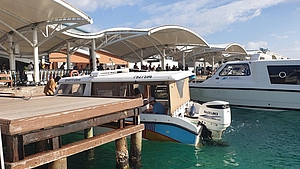
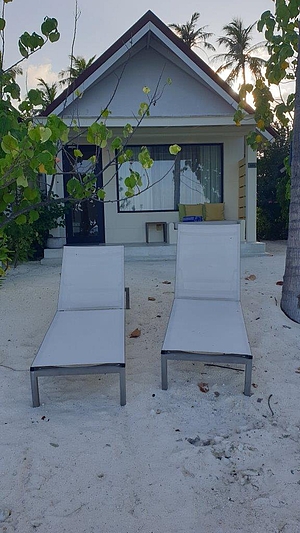

The hotel organized on the next day our transfer back to the Velana port so that we could take a taxi and meet our customers, Danish company Hojgaard, to which we supplied this year our fly ash product for Fuvahmulah Coastal Protection project (see the photos with work in progress and finished). On that occasion we could also see something of the Maldives capital Malé, which is an average town on the biggest island of the Maldives, commercial and political centre of the country. The only sights of interest are coral stones mosques and a fish market.
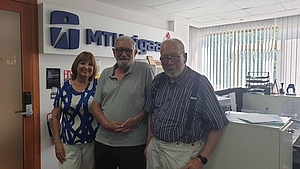
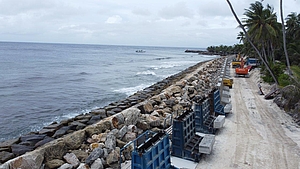
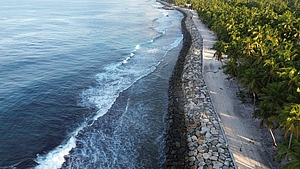
The second half of our stay took place on another private atoll (I have found a definition: an atoll is a ring-shaped island made of coral that surrounds a lagoon) called Lobigili connected with Ailafushi with a long bridge for pedestrians and small electric buggies. Our hotel was called Oblu Select and belonged to the same company Oblu as the one on the previous island. This hotel is meant only for adults, children are not allowed. We were welcome by a glass of Champagne and a red rose, which was given to George so that he would hand it over to me - Lobigili calls itself the island of love.


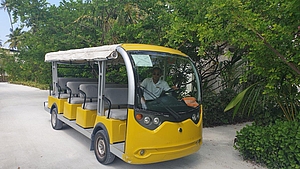
Projects Ailafushi and Lobigili are only two and half years old and the investment into these two private islands must have been enormous. Our villa was placed on a private beach and had a small private pool with the view to the sea. Bathrooms in both places behind the house were in the nature just under the roof. Meals and drinks all included (the system also included alcoholic drinks, which are otherwise not allowed on the „mainland“, the Maldives is a muslim country). The cuisine offered the greatest variety, we had a choice among international, Indian, Malaysian, Chinese, Japanese, Italian and local meals. When George mentioned, more as a joke, that he would like to have a duck which was otherwise not on the menu, the next day we were served for lunch duck breast.


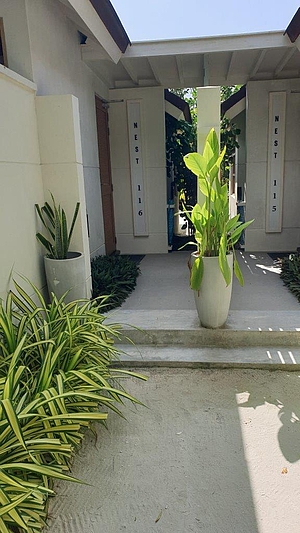
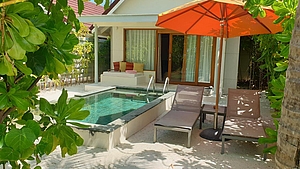
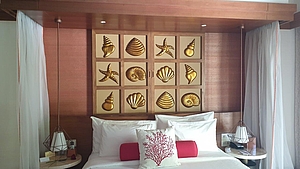
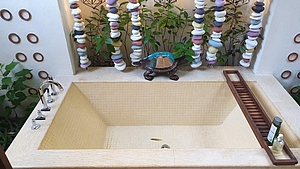
Temperatures between 28 to 32 degrees, lush tropical vegetation, orchids on the palms, white sand and azure sea. The numerous staff, always smiling and asking if we needed something. The employees come mostly from 5 Asian countries - Philippines, Indonesia, Malaysia, India and Sri Lanka, all are excelently trained and speak good English. The only white waitress, „white“ as per description of one of her Filipino colleagues, who was working in the restaurant, was Russian. Our personal assistant organized for us Thai massage, extra dinner with fruit de mer and sea boat excursion to watch a sunset.
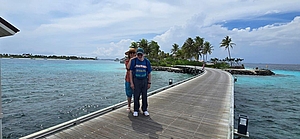
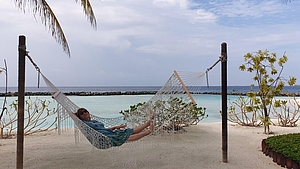
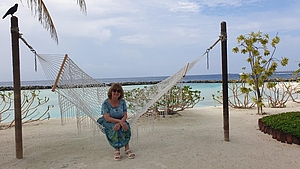
What was great:
The possibility to jump into the pool at our house without a swimming suit every morning.
Dinner in an underwater horse shaped restaurant Only Blue. We were sitting 7 meters under the sea level and could observe scenic coral and marine life.
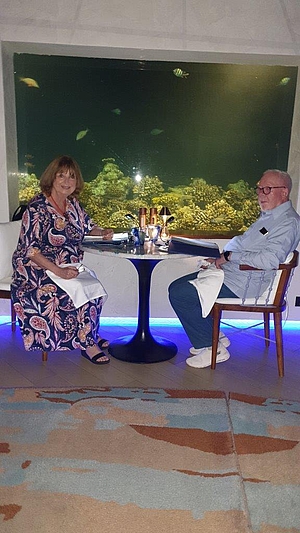
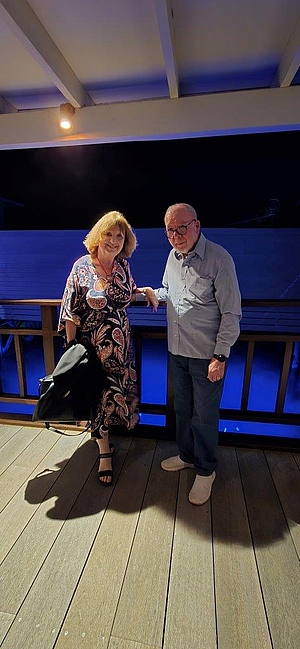
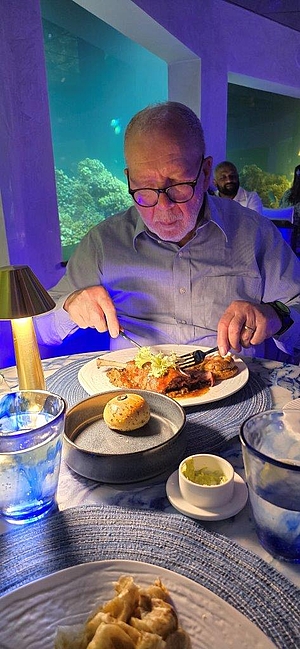
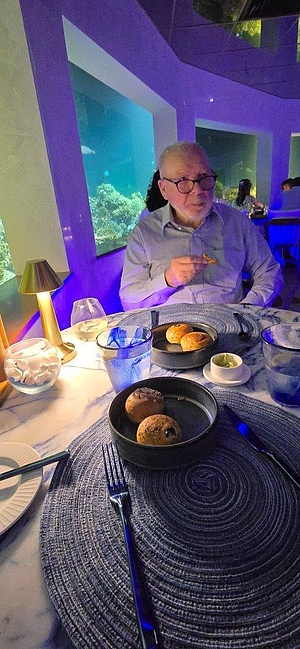
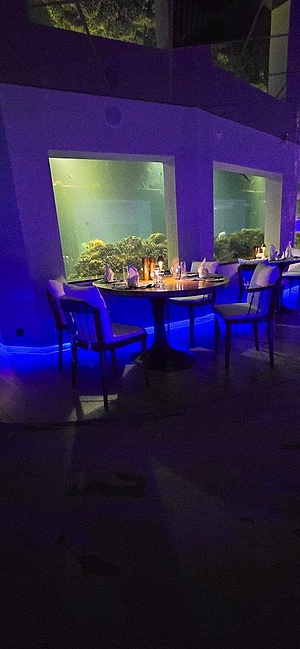
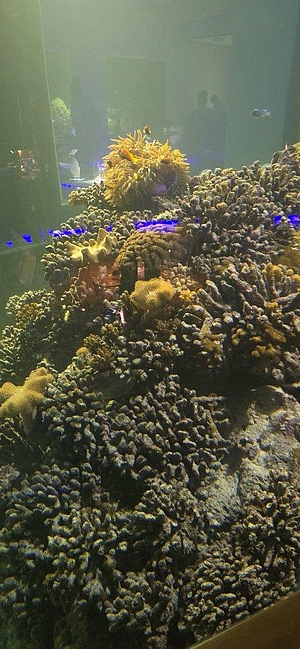
Amazing sunsets, watched from our house, from the bar or from the boat.
But the most amazing was simply to sit at the beach with a glass of wine or cocktail from the every evening changing fountain in hand, sometimes bare feet in the sand. And we were lucky to have full moon over our heads.
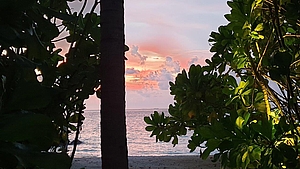
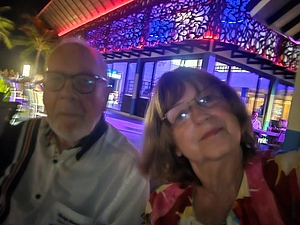
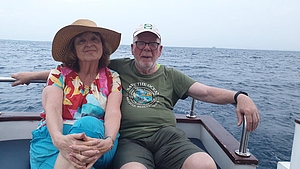
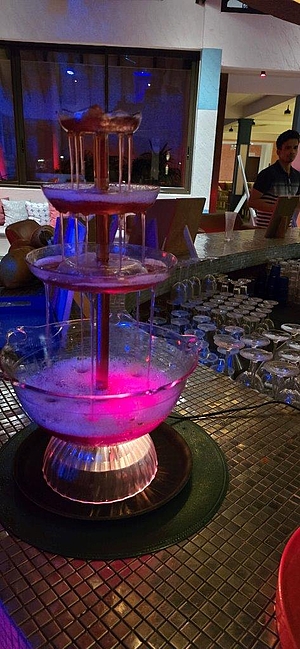

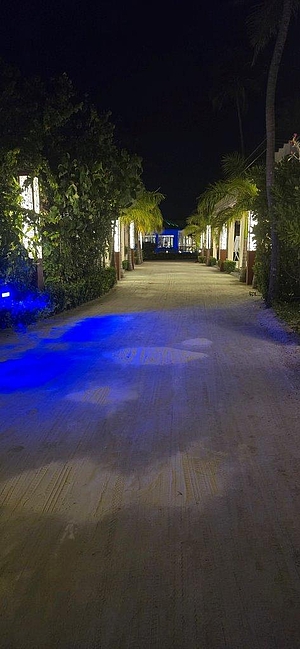
There was a storm on the last night of our stay, and in the morning we went to breakfast with umbrellas. So we also could experience what it's like when it rains in paradise.
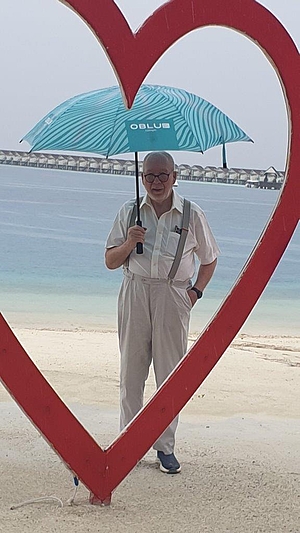
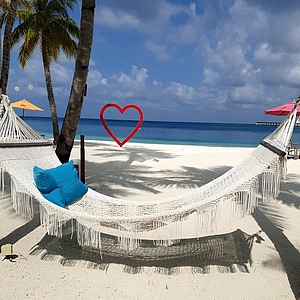
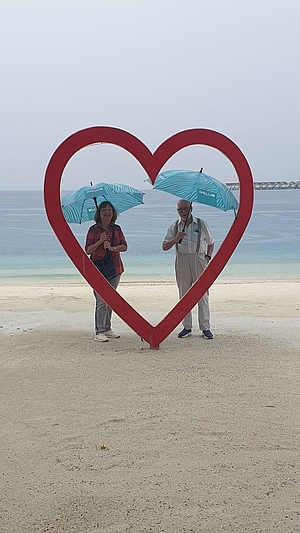
Something about the Maldives
Area: 298 square kilometers
Average ground-level elevation 1,5 meters above sea level, the world´s lowest-lying country.
Population : half a million
Capital: Malé
The official and national language: Dhivehi, an Indo-Aryan language closely related to the Sinhala language of Sri Lanka.
The Maldives' chain of 26 attols stretches across the equator from Ihavandhippolhu Atoll in the north to Addu Atoll in the south. The Maldives has twenty-six natural atolls and a few island groups on isolated reefs,
History:
The Maldives has been inhabited for over 2,500 years. The population was originally Buddhist till the the 12th century. However, in the 12th century, partly due to the importance of the Arabs and Persians as traders in the Indian Ocean, Islam reached the Maldivian Archipelago and the Maldives was soon consolidated as a Sultanate. From the mid-16th century, the region came under the increasing influence of European colonial powers, in usual sequence – Portuguese, Dutch, in the end British. The Maldives became a British Protectorate in 1887.
The independance was declared in 1965, and a presidential republic was established in 1968 with an elected People's Majlis (parliament). The next decades have seen political instability, connected with efforts at democratic reform and environmental challenges posed by climate change and rising sea levels.
Staying on one of the atolls might seem like to stay in a little paradise. Especially the small private attols are beautiful and offer guests luxurious, idylic and relaxing holiday.
However, things have always been boiling beneath the surface of the atolls in the historical past and also in the present time. Even in the relatively stable era of the president Maumoon Abdul Gayoom who was elected in 1978 and whose 30 years rule was supposed to bring some stability and prosperity to the archipelago was disturbed by a series of coup attempts (1980, 1983 and 1988).
The Maldives was, as many other countries, also devasteted by a tsunami in 2004, following the Indian Ocean earthquake. Only nine islands were reported to have escaped any flooding, while fifty-seven islands faced serious damage to critical infrastructure, fourteen islands had to be totally evacuated, and six islands were destroyed. 102 Maldivians and 6 foreigners reportedly died in the tsunami. The destructive impact of the waves on the low-lying islands was mitigated by the fact there was no continental shelf or land mass upon which the waves could gain height. The tallest waves were reported to be 4 meters (there were up to 51 meters high waves in Sumatra).
The dissident journalist and activist Mohamed Nasheed founded a new Maldivian Democratic Party (MDP) and pressurized president Maumoon into allowing gradual political reforms. In 2008, a new constitution was approved and the first direct presidential elections ocurred, which were won by Nasheed in the second round.
His victory had a direct influence on our business activities in the Maldives and our supplies of Pozzocrete for the extension of the International Airport in Male.
In 2010, the Nasheed administration appointed International Finance Corporation (member of the World Bank Grou) to run a bidding process for the privatisation of the main International airport. The bid was won by a consortium between Indian GMR Group and Malaysia Airports (GMIAL) who provided 1 billion rufiyaa (Maldives currency – 1 EUR = 16 rufiyaa) as upfront fee to the government for the expansion and modernisation of the airport by 2014, and its operation for 25 years.
GMR group organized amont others a tender for supply of fly ash and Dirk India had won this tender. There were numerous delays but we started to supply.
Unfortunately, political unrest grew in late 2011, folowing opposition campaigns in the name of protecting Islam. Nasheed resigned from office after large number of police and army mutinied in February 2012. Nasheed's vice-president, Mhamed Waheed Hassan Manik was sworn in as president. Nasheed was later arrested, convicted of terrorism, and sentenced to 13 years. The trial was widely seen as flawed and political.
In late 2012, the new government of Maldives under president Waheed administration declared that the concession agreement for extention of the airport was void ab initio and on 27 November 2012 gave GMIAL a deadline of seven days to 'evict the airport', a decision which drew mass protests from the government's opposition, as well as criticism from the government and media of India. That was also the end of Dirk India supplies – new tenders were organized and Chinese contractors gained the upper hand.
These are just some of the examples of political unrest in the Maldives in 20th and 21st century, which included coup d´etat, contesting the results of elections, imprisonment (and later setting free) of previous presidents, accusations of corruption, etc.
Present president Mohamed Muizzu was sworn in as the eighth President of the Republic of Maldives in 2023. Mohamed Muizzu is widely seen to be pro-China, which means souring relations with India. There was even a conflict when several Maldivian ministers posted derisive comments on social media about Prime Minister Modi, who is adored by most Indians, when he promoted the Indian islands of Lakshadweep (formerly Laccadives) as an equally attractive destination as the Maldives. This offended Indians and some started boycotting the Maldives - in response, 4 more direct flights from the Maldives to China were introduced.
There are problems even in the paradise, but the guests who come to the islands are taken care of in such a way that they can forget all their everyday worries and struggles.

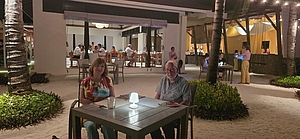
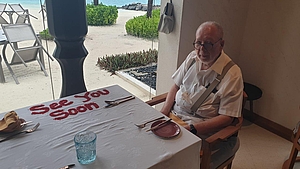
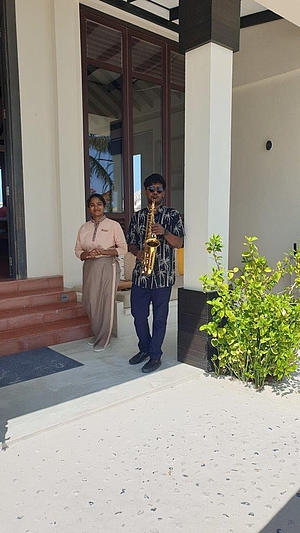
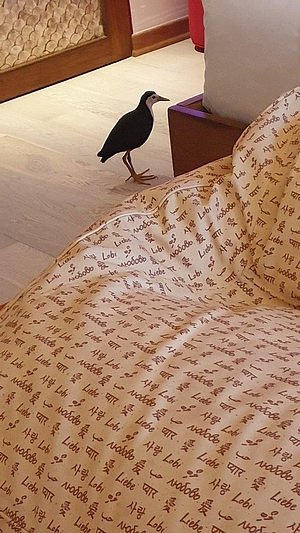
A Saxofonist and white breast water hen (it came to our room) welcomed us and also said goodbye.


